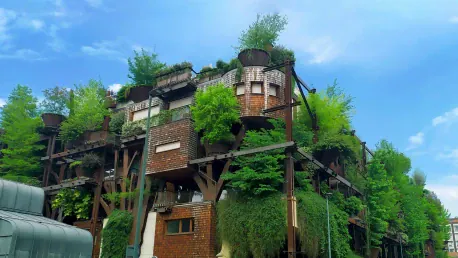Toronto’s housing crisis has been an ongoing challenge for city planners, developers, and residents alike. With the growing demand for affordable and eco-friendly housing, innovative solutions are more critical than ever. One company, Intelligent City, has proposed a revolutionary approach that leverages mass timber, robotics, and advanced automation. This innovative method aims not only to reduce construction timelines but also to minimize the environmental impact, presenting a sustainable solution to the housing shortage in Toronto. Intelligent City’s pioneering strategy, currently implemented in Etobicoke Lakeshore, promises to reshape urban development and address pressing housing issues.
Advanced Construction Techniques and Sustainable Design
Intelligent City has set a new standard by combining off-site manufacturing with cutting-edge technology to fabricate the main structure and envelope of housing projects. Specifically, at the 230 Royal York Drive development, an off-site manufacturing facility in Delta, B.C., is used to produce mass timber panels and modules over a span of four months. The facility employs robotic production lines and AI-driven processes to maintain strict quality control and ensure precise measurements, reducing waste and accelerating production. Real-time AI scanning further enhances accuracy, ensuring all components meet high-quality standards before being transported to the construction site.
The prefabricated components significantly cut on-site construction time by three to four months. This efficiency is achieved by assembling the modules quickly and with fewer disruptions to the surrounding area. Beyond speeding up construction, this method aligns with Toronto’s goals for sustainable and accessible urban housing. By shortening the construction process, the impact on neighboring communities is minimized, creating less noise and inconvenience. The use of mass timber, a renewable and low-carbon material, adds another layer of environmental benefit. Maximizing mass timber’s use could help eliminate 0.6 million tonnes of CO₂ annually in Canada, equating to taking 125,000 cars off the road.
Economic and Environmental Impact
Mass timber’s role in Intelligent City’s approach carries significant cost benefits alongside environmental advantages. Traditional concrete construction is often associated with higher costs and carbon emissions. By contrast, mass timber reduces the carbon footprint and aligns with sustainable development goals. This material not only sequesters carbon dioxide but also showcases renewable resource utilization, crucial for environmentally responsible urban growth. The efficient construction method yields a 10 to 20 percent cost saving compared to traditional methods, achieving affordability—a key concern in Toronto’s housing market.
Moreover, the focus on automation and off-site manufacturing lessens the dependency on on-site labor. Fewer workers are required on-site, reducing overall expenses and further contributing to cost efficiencies. This approach is instrumental for an area grappling with housing shortages and escalating construction costs. The economic benefits extend to building maintenance, as mass timber structures are often easier and cheaper to maintain. By integrating technology with sustainable materials, Intelligent City advances a model that promotes affordable living without compromising on quality or environmental responsibility.
Platforms for Life System
Central to Intelligent City’s success is its “Platforms for Life ™” system, which showcases an integrated solution for addressing housing supply issues. This system encompasses design standardization, mass timber modules, and an AI-driven production line. The goal is to harmonize various stages of design, fabrication, and assembly to enhance efficiency while ensuring safety and aesthetic appeal. Notably, the Delta facility demonstrates the capability of completing the building process within just 90 days after on-site work initiation. This rapid turnaround exemplifies the effectiveness of prefabrication and data-driven construction.
The “Platforms for Life ™” system prioritizes adaptability and scalability, allowing for diverse architectural designs while maintaining structural integrity and safety. This versatility makes it possible to meet varying housing demands across different neighborhoods and cities. For Toronto, the system presents a promising opportunity to address the pressing need for affordable housing. It also offers a blueprint for other regions facing similar housing shortages. By leveraging technology and sustainable materials, Intelligent City provides a compelling case study in modern urban development.
Paving the Way for Future Developments
Toronto’s ongoing housing crisis presents significant challenges for city planners, developers, and residents. With rising demand for both affordable and eco-friendly homes, finding innovative solutions is crucial. Enter Intelligent City, a company introducing a groundbreaking approach by integrating mass timber, robotics, and advanced automation into construction. This method is designed to shorten construction timelines while reducing environmental impact, offering a sustainable solution to Toronto’s housing shortage. Implementation of Intelligent City’s pioneering strategy is currently underway in Etobicoke Lakeshore, poised to dramatically transform urban development. Their approach not only promises to address critical housing issues but also sets a precedent for future eco-friendly construction projects. As the city grapples with burgeoning growth and the necessity for sustainable living solutions, Intelligent City’s efforts may well be a game-changer in tackling the housing crisis in one of North America’s major urban centers.









